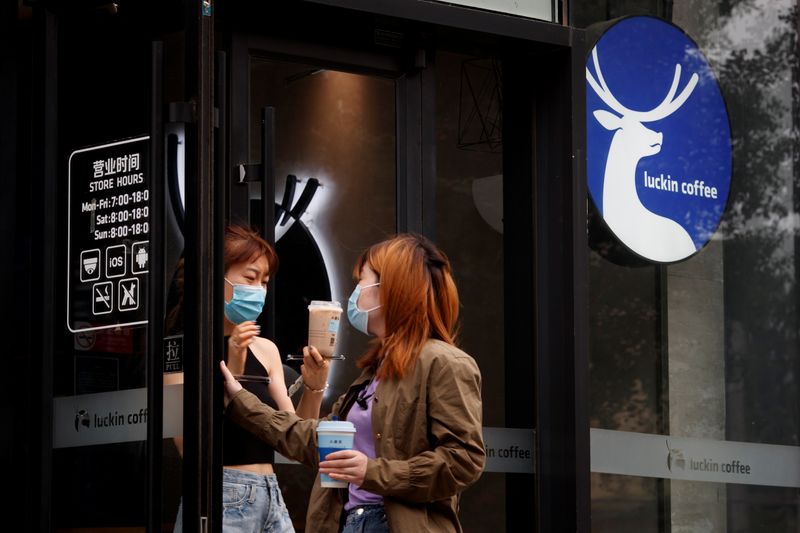By Sophie Yu and Brenda Goh
BEIJING/SHANGHAI (Reuters) - Looking outside her Beijing coffee shop where seven other nearby cafes including a Starbucks compete for customers, Huang Ying is simply glad to still be in business.
In the 17 years since opening her cafe in the trendy 798 Art Zone district, making money has gotten harder - even before the coronavirus. Rent and labour costs have increased while rival after rival waded into a market that has failed to live up to expectations.
"Our profit can't compare with the old days," she said. "I raised prices by 10% in 2017 but that has done little to offset the jump in costs."
As a coffee market, China exerts a magnetic pull for Western brands keen to emulate the success of Starbucks Corp (NASDAQ:SBUX) which has over 4,400 stores in China and is still expanding. Since last year, Canada's Tim Hortons has opened about 60 stores in China while Italy's Lavazza and Sweden's Wayne's Coffee have also made forays into the market.
Much of the optimism about China's coffee market potential stems from just how little its consumers drink - just 5.4 cups per capita last year, compared to 341 in the United States and 591 in Western Europe, according to consultancy Euromonitor.
Chinese coffee consumption is growing at an estimated rate of around 5% annually, but coffee shop proprietors like Huang say it is more important to take note of the huge jump in outlets and cut-throat pricing.
Store openings of specialist coffee and tea shops surged 50% in 2018 and 2019, and China now has some 18,350 stores, more than triple the number in 2014, according to Euromonitor. Coffee is also now sold at many convenience stores and fast-food restaurants.
And while a regular-sized latte costs around 30 yuan ($4.24) in China, it can be as cheap as 4.5 yuan ($0.60) at some places with the use of discount vouchers.
This year's admission by delivery-focused and coupon-reliant Luckin Coffee (OTC:LKNCY) that it fabricated $310 million in sales underscores how the coffee opportunity in China has been exaggerated, analysts said.
"Luckin's fraud proved that even though coffee in China is almost free, the Chinese still don't drink much of it," said Beijing-based independent analyst Keso Hong.
TEA COUNTRY
Tea is China's main source of caffeine and outside of China's biggest cities, buying a branded caffeinated drink to get through the day is not part of everyday life.
Bubble tea, which contains tapioca pearls, is also giving coffee a run for its money. Food delivery giant Meituan Dianping (OTC:MPNGF) received 210 million orders for bubble tea in 2018, "far more than" coffee, it has said without elaborating.
Like Luckin, other domestic chains are struggling to fulfil big dreams.
Coffee Box, which focuses on coffee deliveries and raised some $56 million in funding, has shut or suspended business at dozens of its stores. Grey Box, which offers speciality coffee, said in 2018 it wanted 12 stores in Beijing by end of that year, but has just four. Bruno Caffe has closed most stores and only two remain.
Among western firms, Britain's Costa Coffee, which is owned by Coca-Cola (NYSE:KO), has 300 China stores according to its website, despite earlier ambitions to have had 2,500 by 2018.
The chains did not respond to Reuters requests for comment.
Starbucks, the first big Western brand in the market and now with 20 years in China under its belt, appears to be the only resounding success, having carefully cultivated its image as a premium cafe for young professionals. Some estimates put the U.S. giant's share of China's coffee market at as much as 80%.
Just this week, Starbucks expanded its Chinese ordering services to multiple Alibaba (NYSE:BABA) apps.
The newcomers have, however, wisely decided not to go it alone.
Lavazza has formed a venture with Yum China, the owner of KFC restaurants in China. Restaurant Brands International (NYSE:QSR)'s Tim Hortons said last year it wanted 1,500 stores in China and has gained backing from Tencent Holdings (OTC:TCEHY). Wayne's Coffee signed a 15-year deal with a Chinese master franchisee.
The chains did not respond to requests for comment on their prospects.
But even teaming up with a partner is no guarantee of success given the extreme competition, analysts said.
"Undoubtedly the coffee market in China will continue to grow and consumers are becoming more habitual coffee drinkers but it is still a hard market to win," said Ben Cavender at China Market Research.
($1 = 7.0007 Chinese yuan)
